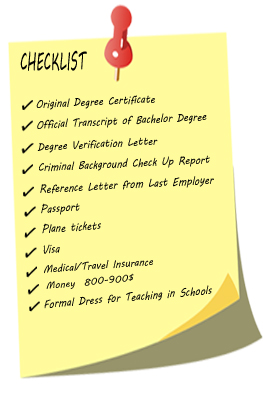Types of Thai Visa
Types of Thai Visa & Thai Visa Rules - Information for TEFL Teachers
Teaching in Thailand is a revered profession and the teachers are looked up to with immense respect. And at par with this honor it is recommended to embark upon a legal hassle free teaching career with an appropriate visa and a fitting work permit. The process of acquiring a visa in Thailand can be complicated and gruesome but it guarantees to preserve your dignity and peace of mind while you revel in a Thai aura.
Tourist Visa
This must be issued by the nearest Thai Embassy or Consulate, wherever you apply from; be it America, UK, Australia, New Zealand, South Africa or Canada. Usually it is a sixty-day tourist visa with the option to extend by 30 days at an Immigration office on the basis of the date of your return ticket. Therefore it is advisable to buy your return ticket to ensure your Thai visa. Once you have your tourist visa, you can travel anywhere within the country.
A double entry tourist Visa would entitle you to the above, with a further 60 day entry once you've left and returned (exit and re-entry) to Thailand and the option to extend by a further 30 days. But you cannot work legally in Thailand on a tourist visa!.
Visa on Arrival
Another option is to get a visa on your arrival at Thailand. The visa will be handed to you as soon as you land in Thailand. Most nationalities can receive 30 days on entry automatically with the option (at the Immigration officers discretion) to extend by 10 days (OR SOMETIMES 14 DAYS) at an Immigration office. However on October 1st 2006, Thai immigration has announced that one could only have a maximum of three 30-days stamp followed by a mandatory 90-days stay outside the country before the Visa is allowed to bear another stamp. Alternatively, you can visit a Thai Consulate abroad to get a ‘proper’ visa (tourist or non-immigrant).
Non-immigrant B Visa
This type is generally obtained once you have found a suitable a job in Thailand in order to apply for a work-permit valid for 3 months. To get one you are required to produce a whole stack of paperwork including a letter of employment, an employment contract, maybe a letter from your embassy (and there is even talk of a security background check). You really need to call the embassy or consulate ahead of time and find out EXACTLY what they require if you want a non-immigrant B Visa. On entry you'll receive 90 days of cover, with the option to extend by 10 days at Immigration You can also obtain double entry Non-immigrant B Visa (two entries of 90 days, the second entry is acquired by exiting and re-entering the country). Multiple-entry Non-immigrant B Visas are the best as they will give you just under 15 months of cover in 90 day intervals. For a one year period, whenever you enter Thailand with the Non-immigrant B Visa you'll receive 90 days on entry. Generally most school prefer you to be on a Non-immigrant B Visa if you wish to obtain a work permit, although as mentioned before a Non-immigrant O (spousal or dependants) Visa is in some ways interchangeable and vice versa.
Non-immigrant O Visa
This is meant generally for people married to a Thai national or with Thai children or dependants. This works in basically the same way as a Non-immigrant B does. However, if you can show funds in a Thai bank account (400,000 baht) or show sufficient proof of local or overseas income to prove that you can support your family, the immigration can indefinitely extend your Visa for up to 12 months. A work permit can now be obtained on a Non-immigration O Visa.
It is important to check all documents over and over again to ensure a smooth visa run.
List of documents including
Original university transcripts; Original university diploma/certificate; Original TEFL/CELTA certificate; Lots of photos (exact size and dress code to be confirmed). Photos for your work permit need to be from the waist up and you must be wearing business attire (suit jackets for guys and girls). Assorted sizes for the different permits (teacher’s license and work permit Health certificate from a Thai doctor
Border hop / Visa run to get a Non immigrant B visa
A border hop means to cross a neighboring border on a wheeled vehicle and then coming straight back into Thailand again. This is usually done to ‘activate’ a second or third entry on a double or triple entry visa. The easiest and the most popular from Thailand being the Thai / Malaysian border point at Pedang Besar, the Thailand / Laos border point at Nong Khai and the Thailand / Cambodia crossing at Aranya Pratheet. As far as consulates are concerned, the most sorted after choices are Penang (Malaysia), and Vientiane (Laos). Other options include Singapore and Phnom Phen.
Schools almost rarely/never pay for a teacher to do a border hop or consulate run. Your school needs to be on the unofficial official school-list at the Consulate to be visited, in order to avail a Non-immigrant Visa. However there are many ‘human factors’ involved when you apply for a visa. Sitting with the immigration officer across the table and carrying all the necessary paperwork, you might end up getting a Non-Immigrant Visa if you look clean and presentable.
The basics checkpoints before applying for a work permit
Ensure that the Company has a minimum of 2 Million Baht as paid up registered capital per work permit. Make sure that the capital is not registered only on paper.
The Company should have at least four employees per work permit on its roles.
Be sure it is not a dubious company with an “office in its pocket”. The company should be paying VAT and have the necessary papers in order.
Work Permit
A legal teacher has a
i) Teacher's license (from the Thai Ministry of Education),
ii) A work permit (from the Thai Labor Department) and
iii) A one-year visa (from the Thai Immigration Dept).
The teacher first needs to have a Non-Immigrant Visa in order to apply for a work permit. And subsequently a visa with an extended duration up to one year is issued on the strength of the work permit - a mandatory criterion for a foreign teaching professional in Thailand. It is essential for the teacher to be tolerant and helpful towards the school and provide them with all the required documents in the process of gaining a work permit.
The initial step towards getting a work permit is to arrange for the ‘teachers license’ by providing:
A personal information document
About 12 one and a half inch photos,
About 12 two inch photos,
A current health certificate
Copies of your degree and other certificates (originals may be requested along with transcripts)
Certified Thai translations of your degree and other certificates
Copies of every page of your passport,
School director's license,
School principal's license,
Map of school,
Teaching schedule of teacher,
List of other work permit holders at the school,
A new blank teacher's license book (blue),
Form Sor Chor 10, Form Sor Chor 17, Form Ror 11
And if you've had a license before, then you can add -
Ror 12, Sor Chor 19, Sor Chor 18, and
Your blue license book (not to be confused with the work permit book)
All the above documents are signed and submitted to the Thai Ministry of Education in quadruplicates. It takes about a week from then to get the license. You take this, along with most of the same documents as above to the Labour Department, who will issue a receipt of application. You can use the receipt to extend your visa - the implication being that your application won't be turned down at this stage. After about three weeks you pick up your new work permit. When the time comes for renewal, it's a good idea to remind your school about one month before the expiry date. The school’s rapport with the Ministry of Education plays a decisive role here.
A work permit the teacher to teach only in the location written on the inside cover of the same. The moment a teacher goes ‘outside’ perhaps to teach corporate clients at their company offices, the teacher is breaking the law.
A foreigner who receives a work permit must abide by the following regulations:
Carry the work permit with him/her or keep it in the office during working hours to show to government officers any time.
Penalty: Anyone who violates this rule will be fined not more than 1,000 baht (approx.).
The foreigner must perform the work according to the work permit.. If he/ she want to do different work or change locality of working place, this change must be approved.
Penalty: Anyone who violate this rule will be imprisoned not more than 1 month or fined not more than 2,000 baht (approx.) or both.
The foreigner who wishes to continue working must apply for an extension before the expiration date.
Penalty: Anyone who violates this rule will be imprisoned not more than 3 months or fined not more than 5,000 baht (approx) or both.
If his/her work permit is materially damaged or lost, the foreigner must apply for substitute within 15 days from the date he/she knows about the damage or disappearance of the work permit.
Penalty: Anyone who violates this rule will be fined not more than 500 baht (approx.)
In case the foreigner changes his/her first name, last name, nationality , address, or name of the working place, he/she must notify the Employment Service office to update the information as soon as possible.
After the foreigner resigns from work, he/she must return the work permit within 7 days from the date of the resignation Penalty: Anyone who violates this rule will be fined not more than 1000 baht (approx.).
As notified by the Thai Government , all aliens engaged in any kind of work in Thailand must hold a valid work permit issued by the Department of Employment of the Ministry of Labor and Social Welfare pursuant to the Alien Employment Act B.E. 2521 (A.D. 1978).
The term ‘work’ here covers both physical and mental activities whether or not for wages or other remuneration. Working without a valid work permit even for a day is a criminal offense. The validity period of a work permit is governed by the holder's immigration status, i.e. a work permit usually expires on the last day of the period of stay allowed by immigration officials as shown on the alien's visa. Aliens holding transit and tourist visas are not permitted to work.
RE-entry Permit
A re-entry permit saves you from the hassle of your non-immigrant visa getting cancelled in case you leave the country. The permit collected from immigration or at the airport (before you go through immigration to leave) costs 1000 baht (approx.) for a single re-entry, or 3,800 for a multiple. It's valid is same as that of your visa. If you have a multiple entry non-immigrant visa which has been extended on a work permit (or you have a work permit application in process) then you still need a re-entry permit, because a new entry is considered to be a new visa, and everything will have been cancelled.
Overstaying a Visa
It is important to get an extension either from the Immigration a day or two before the Visa is scheduled to get expired or do a ‘border run’ to obtain a further amount of days in order not to ‘overstay’ which is but obviously illegal in Thailand. Overstay starts from the day your Visa runs out. For example, if a Visa runs out on the 8th day of any given month and you are on the 9th, you'll pay 500 Baht overstay. 10 days would be 5,000 Baht, 20 = 10,000 Baht and so on and so on until you get to the ceiling fine amount which is 20,000 Baht.
To break a contract
If a teacher breaks his contract with the school, he/she needs to reimburse the school for the costs of work permit, teacher’s license, admin staff's shoe leather, etc, etc.
Once you quit a job, your work permit and one-year visa are null and void. You are allowed a maximum of seven days to leave the country and get a new visa.
It is suggested to keep tabs on exactly when the school hands back your work permit to the labor department, because that's when the 7-day clock starts ticking.
Breaking a contract is worth avoiding under any given circumstances.
But, if your written employment contract has a notice period clause in it (as is common), for example, allowing your employer or you to terminate the contract on one month's written notice to the other party, you are NOT breaking your contract by giving your employer one month's written notice of leaving. You are terminating your contract by agreement. This is as valid in Thai law as in US or UK law
Keep a copy of your letter of notice and contact the Ministry of Labour if your old employer refuses to give you/the Min of Labour a release form (Tor Dor 11) agreeing to your leaving and allowing you to get a new work permit.



 I heard great things about this TESOL course from 4 different people who went through it last year. I have always wanted to travel and teach, so this program was perfect for me.
I heard great things about this TESOL course from 4 different people who went through it last year. I have always wanted to travel and teach, so this program was perfect for me.  After looking at other programs in Thailand, I found ACT was offering the lowest price. Also, Kiersten and I came together and her friends had previously done the ACT program and they had nothing but good things to say about the program.
After looking at other programs in Thailand, I found ACT was offering the lowest price. Also, Kiersten and I came together and her friends had previously done the ACT program and they had nothing but good things to say about the program.  The ACT program seemed to be a great way to receive hands on training. It was a great learning experience. Sangeeta and Pak did a great job throughout and I was continually impressed with them and how professional the company was.
The ACT program seemed to be a great way to receive hands on training. It was a great learning experience. Sangeeta and Pak did a great job throughout and I was continually impressed with them and how professional the company was. 